- Home
- Lemony Snicket
The Bad Beginning Page 3
The Bad Beginning Read online
Page 3
Just as they were placing the pudding in the refrigerator to cool, Violet, Klaus, and Sunny heard a loud, booming sound as the front door was flung open, and I'm sure I don't have to tell you who was home.
``Orphans?'' Count Olaf called out in his scratchy voice. ``Where are you, orphans?''
``In the kitchen, Count Olaf,'' Klaus called. ``We're just finishing dinner.''
``You'd better be,'' Count Olaf said, and strode into the kitchen. He gazed at all three Baudelaire children with his shiny, shiny eyes. ``My troupe is right behind me and they are very hungry. Where is the roast beef?''
``We didn't make roast beef,'' Violet said. ``We made puttanesca sauce.''
``What?'' Count Olaf asked. ``No roast beef?''
``You didn't tell us you wanted roast beef,'' Klaus said.
Count Olaf slid toward the children so that he looked even taller than he was. His eyes grew even brighter, and his one eyebrow raised in anger. ``In agreeing to adopt you,'' he said, ``I have become your father, and as your father I am not someone to be trifled with. I demand that you serve roast beef to myself and my guests.''
``We don't have any!'' Violet cried. ``We made puttanesca sauce!''
``No! No! No!'' Sunny shouted.
Count Olaf looked down at Sunny, who had spoken so suddenly. With an inhuman roar he picked her up in one scraggly hand and raised her so she was staring at him in the eye. Needless to say, Sunny was very frightened and began crying immediately, too scared to even try to bite the hand that held her.
``Put her down immediately, you beast!'' Klaus shouted. He jumped up, trying to rescue Sunny from the grasp of the Count, but he was holding her too high to reach. Count Olaf looked down at Klaus and smiled a terrible, toothy grin, raising the wailing Sunny up even higher in the air. He seemed about to drop her to the floor when there was a large burst of laughter in the next room.
``Olaf! Where's Olaf?'' voices called out. Count Olaf paused, still holding the wailing Sunny up in the air, as members of his theater troupe walked into the kitchen. Soon they were crowding the room-an assortment of strange-looking characters of all shapes and sizes. There was a bald man with a very long nose, dressed in a long black robe. There were two women who had bright white powder all over their faces, making them look like ghosts. Behind the women was a man with very long and skinny arms, at the end of which were two hooks instead of hands. There was a person who was extremely fat, and who looked like neither a man nor a woman. And behind this person, standing in the doorway, were an assortment of people the children could not see but who promised to be just as frightening.
``Here you are, Olaf,'' said one of the white-faced women. ``What in the world are you doing?''
``I'm just disciplining these orphans,'' Count Olaf said. ``I asked them to make dinner, and all they have made is some disgusting sauce.''
``You can't go easy on children,'' the man with the hook-hands said. ``They must be taught to obey their elders.''
The tall, bald man peered at the youngsters. ``Are these,'' he said to Count Olaf, ``those wealthy children you were telling me about?''
``Yes,'' Count Olaf said. ``They are so awful I can scarcely stand to touch them.'' With that, he lowered Sunny, who was still wailing, to the floor. Violet and Klaus breathed a sigh of relief that he had not dropped her from that great height.
``I don't blame you,'' said someone in the doorway.
Count Olaf rubbed his hands together as if he had been holding something revolting instead of an infant. ``Well, enough talk,'' he said. ``I suppose we will eat their dinner, even though it is all wrong. Everyone, follow me to the dining room and I will pour us some wine. Perhaps by the time these brats serve us, we will be too drunk to care if it is roast beef or not.''
``Hurrah!'' cried several members of the troupe, and they marched through the kitchen, following Count Olaf into the dining room. Nobody paid a bit of attention to the children, except for the bald man, who stopped and stared Violet in the eye.
``You're a pretty one,'' he said, taking her face in his rough hands. ``If I were you I would try not to anger Count Olaf, or he might wreck that pretty little face of yours.'' Violet shuddered, and the bald man gave a high-pitched giggle and left the room.
The Baudelaire children, alone in the kitchen, found themselves breathing heavily, as if they had just run a long distance. Sunny continued to wail, and Klaus found that his eyes were wet with tears as well. Only Violet didn't cry, but merely trembled with fear and revulsion, a word which here means ``an unpleasant mixture of horror and disgust.'' For several moments none of them could speak.
``This is terrible, terrible,'' Klaus said finally. ``Violet, what can we do?''
``I don't know,'' she said. ``I'm afraid.''
``Me too,'' Klaus said.
``Hux!'' Sunny said, as she stopped crying.
``Let's have some dinner!'' someone shouted from the dining room, and the theater troupe began pounding on the table in strict rhythm, which is an exceedingly rude thing to do.
``We'd better serve the puttanesca,'' Klaus said, ``or who knows what Count Olaf will do to us.''
Violet thought of what the bald man had said, about wrecking her face, and nodded. The two of them looked at the pot of bubbling sauce, which had seemed so cozy while they were making it and now looked like a vat of blood. Then, leaving Sunny behind in the kitchen, they walked into the dining room, Klaus carrying a bowl of the interestingly shaped noodles and Violet carrying the pot of puttanesca sauce and a large ladle with which to serve it. The theater troupe was talking and cackling, drinking again and again from their wine cups and paying no attention to the Baudelaire orphans as they circled the table serving everyone dinner. Violet's right hand ached from holding the heavy ladle. She thought of switching to her left hand, but because she was right-handed she was afraid she might spill the sauce with her left hand, which could enrage Count Olaf again. She stared miserably at Olaf's plate of food and found herself wishing she had bought poison at the market and put it in the puttanesca sauce. Finally, they were through serving, and Klaus and Violet slipped back into the kitchen. They listened to the wild, rough laughter of Count Olaf and his theater troupe, and they picked at their own portions of food, too miserable to eat. Before long, Olaf's friends were pounding on the table in strict rhythm again, and the orphans went out to the dining room to clear the table, and then again to serve the chocolate pudding. By now it was obvious that Count Olaf and his associates had drunk a great deal of wine, and they slouched at the table and spoke much less. Finally, they roused themselves, and trooped back through the kitchen, scarcely glancing at the children on their way out of the house. Count Olaf looked around the room, which was filled with dirty dishes.
``Because you haven't cleaned up yet,'' he said to the orphans, ``I suppose you can be excused from attending tonight's performance. But after cleaning up, you are to go straight to your beds.''
Klaus had been glaring at the floor, trying to hide how upset he was. But at this he could not remain silent. ``You mean our bed!'' he shouted. ``You have only provided us with one bed!''
Members of the theater troupe stopped in their tracks at this outburst, and glanced from Klaus to Count Olaf to see what would happen next. Count Olaf raised his one eyebrow, and his eyes shone bright, but he spoke calmly.
``If you would like another bed,'' he said, ``tomorrow you may go into town and purchase one.''
``You know perfectly well we haven't any money,'' Klaus said.
``Of course you do,'' Count Olaf said, and his voice began to get a little louder. ``You are the inheritors of an enormous fortune.''
``That money,'' Klaus said, remembering what Mr. Poe said, ``is not to be used until Violet is of age.''
Count Olaf's face grew very red. For a moment he said nothing. Then, in one sudden movement, he reached down and struck Klaus across the face. Klaus fell to the floor, his face inches from the eye tattooed on Olaf's ankle. His glasses leaped from his face and skittered into a corn
er. His left cheek, where Olaf had struck him, felt as if it were on fire. The theater troupe laughed, and a few of them applauded as if Count Olaf had done something very brave instead of something despicable.
``Come on, friends,'' Count Olaf said to his comrades. ``We'll be late for our own performance.''
``If I know you, Olaf,'' said the man with the hook-hands, ``you'll figure out a way to get at that Baudelaire money.''
``We'll see,'' Count Olaf said, but his eyes were shining bright as if he already had an idea. There was another loud boom as the front door shut behind Count Olaf and his terrible friends, and the Baudelaire children were alone in the kitchen. Violet knelt at Klaus's side, giving him a hug to try to make him feel better. Sunny crawled over to his glasses, picked them up, and brought them to him. Klaus began to sob, not so much from the pain but from rage at the terrible situation they were in. Violet and Sunny cried with him, and they continued weeping as they washed the dishes, and as they blew out the candles in the dining room, and as they changed out of their clothes and lay down to go to sleep, Klaus in the bed, Violet on the floor, Sunny on her little cushion of curtains. The moonlight shone through the window, and if anyone had looked into the Baudelaire orphans' bedroom, they would have seen three children crying quietly all night long.
Chapter Five
Unless you have been very, very lucky, you have undoubtedly experienced events in your life that have made you cry. So unless you have been very, very lucky, you know that a good, long session of weeping can often make you feel better, even if your circumstances have not changed one bit. So it was with the Baudelaire orphans. Having cried all night, they rose the next morning feeling as if a weight were off their shoulders. The three children knew, of course, that they were still in a terrible situation, but they thought they might do something to make it better.
The morning's note from Count Olaf ordered them to chop firewood in the backyard, and as Violet and Klaus swung the axe down over each log to break it into smaller pieces, they discussed possible plans of action, while Sunny chewed meditatively on a small piece of wood.
``Clearly,'' Klaus said, fingering the ugly bruise on his face where Olaf had struck him, ``we cannot stay here any longer. I would rather take my chances on the streets than live in this terrible place.''
``But who knows what misfortunes would befall us on the streets?'' Violet pointed out. ``At least here we have a roof over our heads.''
``I wish our parents' money could be used now, instead of when you come of age,'' Klaus said. ``Then we could buy a castle and live in it, with armed guards patrolling the outside to keep out Count Olaf and his troupe.''
``And I could have a large inventing studio,'' Violet said wistfully. She swung the axe down and split a log neatly in two. ``Filled with gears and pulleys and wires and an elaborate computer system.''
``And I could have a large library,'' Klaus said, ``as comfortable as Justice Strauss's, but more enormous.''
``Gibbo!'' Sunny shrieked, which appeared to mean ``And I could have lots of things to bite.''
``But in the meantime,'' Violet said, ``we have to do something about our predicament.''
``Perhaps Justice Strauss could adopt us,'' Klaus said. ``She said we were always welcome in her home.''
``But she meant for a visit, or to use her library,'' Violet pointed out. ``She didn't mean to live.''
``Perhaps if we explained our situation to her, she would agree to adopt us,'' Klaus said hopefully, but when Violet looked at him she saw that he knew it was of no use. Adoption is an enormous decision, and not likely to happen impulsively. I'm sure you, in your life, have occasionally wished to be raised by different people than the ones who are raising you, but knew in your heart that the chances of this were very slim.
``I think we should go see Mr. Poe,'' Violet said. ``He told us when he dropped us here that we could contact him at the bank if we had any questions.''
``We don't really have a question,'' Klaus said. ``We have a complaint.'' He was thinking of Mr. Poe walking toward them at Briny Beach, with his terrible message. Even though the fire was of course not Mr. Poe's fault, Klaus was reluctant to see Mr. Poe because he was afraid of getting more bad news.
``I can't think of anyone else to contact,'' Violet said. ``Mr. Poe is in charge of our affairs, and I'm sure if he knew how horrid Count Olaf is, he would take us right out of here.''
Klaus pictured Mr. Poe arriving in his car and putting the Baudelaire orphans inside, to go somewhere else, and felt a stirring of hope. Anywhere would be better than here.
``Okay,'' he said. ``Let's get this firewood all chopped and we'll go to the bank.''
Invigorated by their plan, the Baudelaire orphans swung their axes at an amazing speed, and soon enough they were done chopping firewood and ready to go to the bank. They remembered Count Olaf saying he had a map of the city, and they looked thoroughly for it, but they couldn't find any trace of a map, and decided it must be in the tower, where they were forbidden to go. So, without directions of any sort, the Baudelaire children set off for the city's banking district in hopes of finding Mr. Poe.
After walking through the meat district, the flower district, and the sculpture district, the three children arrived at the banking district, pausing to take a refreshing sip of water at the Fountain of Victorious Finance. The banking district consisted of several wide streets with large marble buildings on each side of them, all banks. They went first to Trustworthy Bank, and then to Faithful Savings and Loan, and then to Subservient Financial Services, each time inquiring for Mr. Poe. Finally, a receptionist at Subservient said she knew that Mr. Poe worked down the street, at Mulctuary Money Management. The building was square and rather plain-looking, though once inside, the three orphans were intimidated by the hustle and bustle of the people as they raced around the large, echoey room. Finally, they asked a uniformed guard whether they had arrived at the right place to speak to Mr. Poe, and he led them into a large office with many file cabinets and no windows.
``Why, hello,'' said Mr. Poe, in a puzzled tone of voice. He was sitting at a desk covered in typed papers that looked important and boring. Surrounding a small framed photograph of his wife and his two beastly sons were three telephones with flashing lights. ``Please come in.''
``Thank you,'' said Klaus, shaking Mr. Poe's hand. The Baudelaire youngsters sat down in three large and comfortable chairs.
Mr. Poe opened his mouth to speak, but had to cough into a handkerchief before he could begin. ``I'm very busy today,'' he said finally. ``So I don't have too much time to chat. Next time you should call ahead of time when you plan on being in the neighborhood, and I will put some time aside to take you to lunch.''
``That would be very pleasant,'' Violet said, ``and we're sorry we didn't contact you before we stopped by, but we find ourselves in an urgent situation.''
``Count Olaf is a madman,'' Klaus said, getting right to the point. ``We cannot stay with him.''
``He struck Klaus across the face. See his bruise?'' Violet said, but just as she said it, one of the telephones rang, in a loud, unpleasant wail. ``Excuse me,'' Mr. Poe said, and picked up the phone. ``Poe here,'' he said into the receiver. ``What? Yes. Yes. Yes. Yes. No. Yes. Thank you.'' He hung up the phone and looked at the Baudelaires as if he had forgotten they were there.
``I'm sorry,'' Mr. Poe said, ``what were we talking about? Oh, yes, Count Olaf. I'm sorry you don't have a good first impression of him.''
``He has only provided us with one bed,'' Klaus said.
``He makes us do a great many difficult chores.''
``He drinks too much wine.''
``Excuse me,'' Mr. Poe said, as another telephone rang. ``Poe here,'' he said. ``Seven. Seven. Seven. Seven. Six and a half. Seven. You're welcome.'' He hung up and quickly wrote something down on one of his papers, then looked at the children. ``I'm sorry,'' he said, ``what were you saying about Count Olaf? Making you do chores doesn't sound too bad.''
``He calls us orphans.''
>
``He has terrible friends.''
``He is always asking about our money.''
``Poko!'' (This was from Sunny.)
Mr. Poe put up his hands to indicate he had heard enough. ``Children, children,'' he said. ``You must give yourselves time to adjust to your new home. You've only been there a few days.''
``We have been there long enough to know Count Olaf is a bad man,'' Klaus said.
Mr. Poe sighed, and looked at each of the three children. His face was kind, but it didn't look like he really believed what the Baudelaire orphans were saying. ``Are you familiar with the Latin term ``in loco parentis''?'' he asked.
Violet and Sunny looked at Klaus. The biggest reader of the three, he was the most likely to know vocabulary words and foreign phrases. ``Something about trains?'' he asked. Maybe Mr. Poe was going to take them by train to another relative.
Mr. Poe shook his head. `` ``In loco parentis'' means ``acting in the role of parent,'' '' he said. ``It is a legal term and it applies to Count Olaf. Now that you are in his care, the Count may raise you using any methods he sees fit. I'm sorry if your parents did not make you do any household chores, or if you never saw them drink any wine, or if you like their friends better than Count Olaf's friends, but these are things that you must get used to, as Count Olaf is acting in loco parentis. Understand?''
``But he struck my brother!'' Violet said. ``Look at his face!''
As Violet spoke, Mr. Poe reached into his pocket for his handkerchief and, covering his mouth, coughed many, many times into it. He coughed so loudly that Violet could not be certain he had heard her.
``Whatever Count Olaf has done,'' Mr. Poe said, glancing down at one of his papers and circling a number, ``he has acted in loco parentis, and there's nothing I can do about it. Your money will be well protected by myself and by the bank, but Count Olaf's parenting techniques are his own business. Now, I hate to usher you out posthaste, but I have very much work to do.''

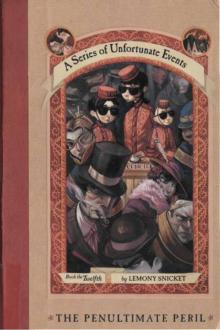 The Penultimate Peril
The Penultimate Peril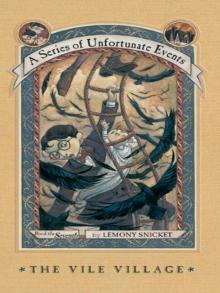 The Vile Village
The Vile Village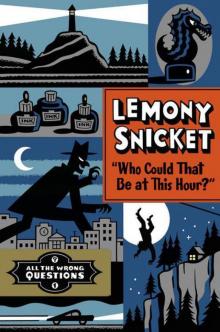 Who Could That Be at This Hour?
Who Could That Be at This Hour?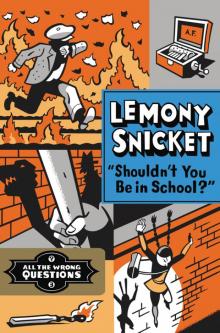 Shouldn't You Be in School?
Shouldn't You Be in School?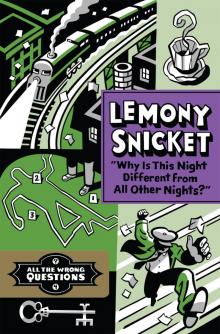 Why Is This Night Different From All Other Nights?
Why Is This Night Different From All Other Nights?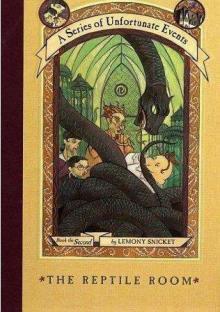 The Reptile Room
The Reptile Room File Under: 13 Suspicious Incidents (1-6)
File Under: 13 Suspicious Incidents (1-6) The End
The End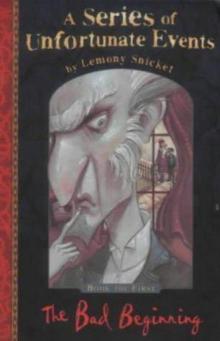 The Bad Beginning
The Bad Beginning When Did You See Her Last?
When Did You See Her Last?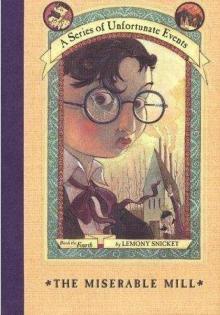 The Miserable Mill
The Miserable Mill The Grim Grotto
The Grim Grotto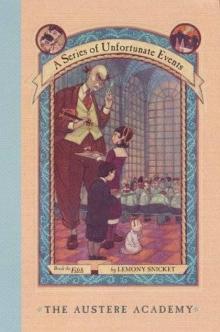 The Austere Academy
The Austere Academy The Ersatz Elevator
The Ersatz Elevator The Wide Window
The Wide Window The Carnivorous Carnival
The Carnivorous Carnival A Series of Unfortunate Events Box: The Complete Wreck
A Series of Unfortunate Events Box: The Complete Wreck The Slippery Slope
The Slippery Slope Read Something Else
Read Something Else The Carnivorous Carnival asoue-9
The Carnivorous Carnival asoue-9 When Did You See Her Last
When Did You See Her Last The Slippery Slope asoue-10
The Slippery Slope asoue-10 The Hostile Hospital asoue-8
The Hostile Hospital asoue-8 A Series of Unfortunate Events Collection: Books 1-13 with Bonus Material
A Series of Unfortunate Events Collection: Books 1-13 with Bonus Material The End asoue-13
The End asoue-13 File Under
File Under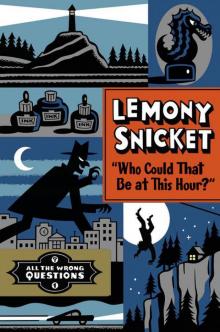 Who Could That Be at This Hour? (All the Wrong Questions)
Who Could That Be at This Hour? (All the Wrong Questions)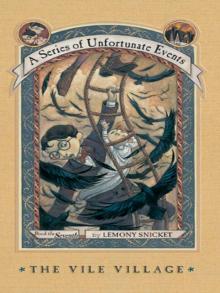 The Vile Village asoue-7
The Vile Village asoue-7 The Grim Grotto asoue-11
The Grim Grotto asoue-11